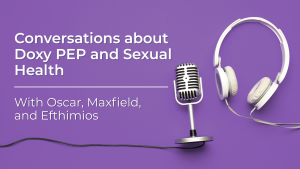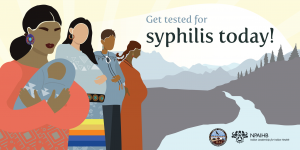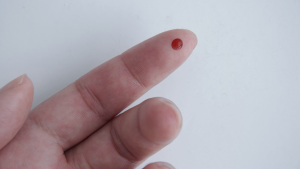In the wake of rapidly climbing congenital syphilis rates, the American College of Obstetricians and Gynecologists (ACOG) recently released new guidelines suggesting more frequent testing during pregnancy. ACOG is now recommending that all pregnant people be screened three times: at the first prenatal visit, during the third trimester, and at birth.
This varies slightly from the organization’s earlier recommendations and the treatment guidelines from the Centers for Disease Control and Prevention (CDC) that take a risk-based approach to third trimester screenings.
What is syphilis and why should pregnant people be tested?
Syphilis is an infection caused by the bacteria Treponema pallidum. It can be passed during vaginal, anal, or oral sex. Congenital syphilis is passed during pregnancy or childbirth from a pregnant person to their baby.
In recent years, syphilis cases have been increasing, and there has been a surge in cases among newborns. There were 3,755 babies born with congenital syphilis in 2022 alone. This over 10 times more babies than were born with syphilis in 2012.
Syphilis during pregnancy is a serious issue. It can cause miscarriage, stillbirth, and even infant death. Babies born with syphilis can face lifelong medical issues.
Public health experts agree that the rise in congenital syphilis represents a failure of STI prevention combined with a failure to reach all pregnant women with prenatal care. The CDC points out that 40% of people who had a baby with syphilis in 2022 did not get proper prenatal care.
Some pregnant patients were not screened for syphilis while others were not treated after testing positive. The CDC believes that 9 in 10 cases of congenital syphilis might have been prevented with timely testing and treatment.
Recommendations for Syphilis Testing During Pregnancy
Screening guidelines have always suggested that all pregnant people be tested for syphilis at their first prenatal visit. In fact, most states have laws mandating syphilis tests at the first visit. Only 15 states, however, require repeat syphilis tests in the third trimester and only six require testing at the time of delivery.
A handful of states do say that people at increased risk must be tested a second and possibly third time which has been the guidance from the CDC and ACOG until now.
The CDC Treatment Guidelines (2021) suggest that screenings during the third trimester and at birth should be done for pregnant people at increased risk by virtue of their living situations (those who are unhoused, incarcerated, or live in communities with high syphilis rates) or their behavior (those who use drugs, engage in transactional sex, or have had multiple partners during pregnancy).
ACOG continues to endorse the CDC Treatment Guidelines but is now recommending its members move away from the risk model. ACOG’s updated recommendations explain the shift: “[I]n the context of the rapidly increasing rates of congenital syphilis, obstetrician-gynecologists and other obstetric care professionals should screen all pregnant individuals serologically for syphilis at the first prenatal care visit, followed by universal rescreening during the third trimester and at birth, rather than use a risk-based approach to testing.”
The organization also stresses that most cases of congenital syphilis could be prevented with proper prenatal care. For this reason, it tells its members “it is important to make any health care encounter during pregnancy—including those in emergency departments, jails, syringe service programs, and maternal and child health programs—an opportunity to screen for syphilis.”
Congenital syphilis is preventable with widespread screening and treatment. Hopefully, these new guidelines will increase screening among pregnant people.






